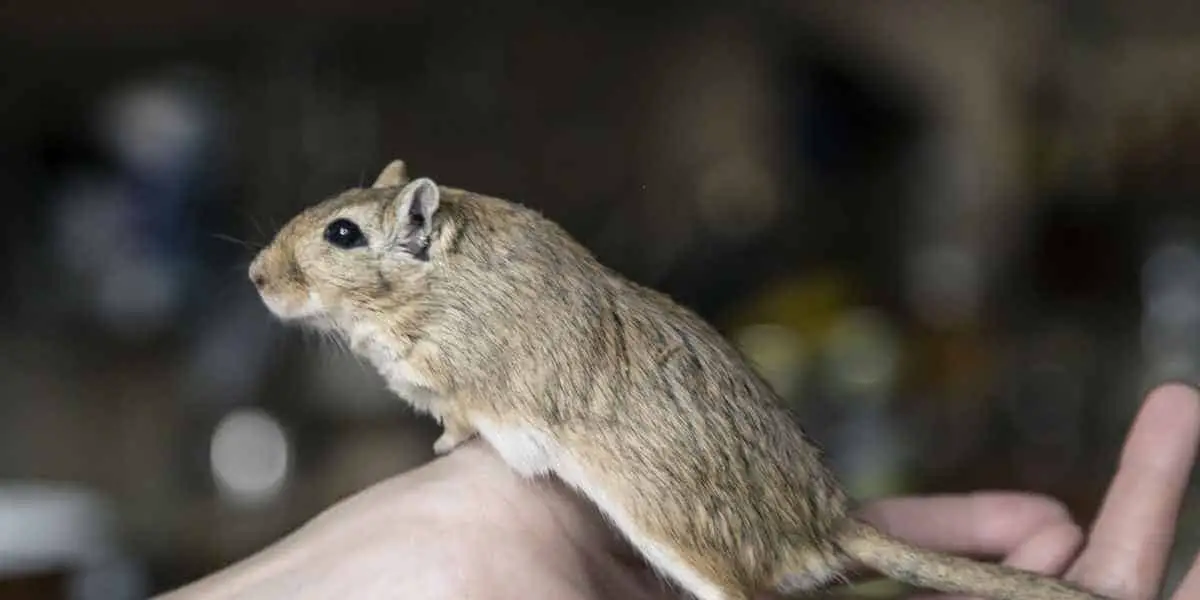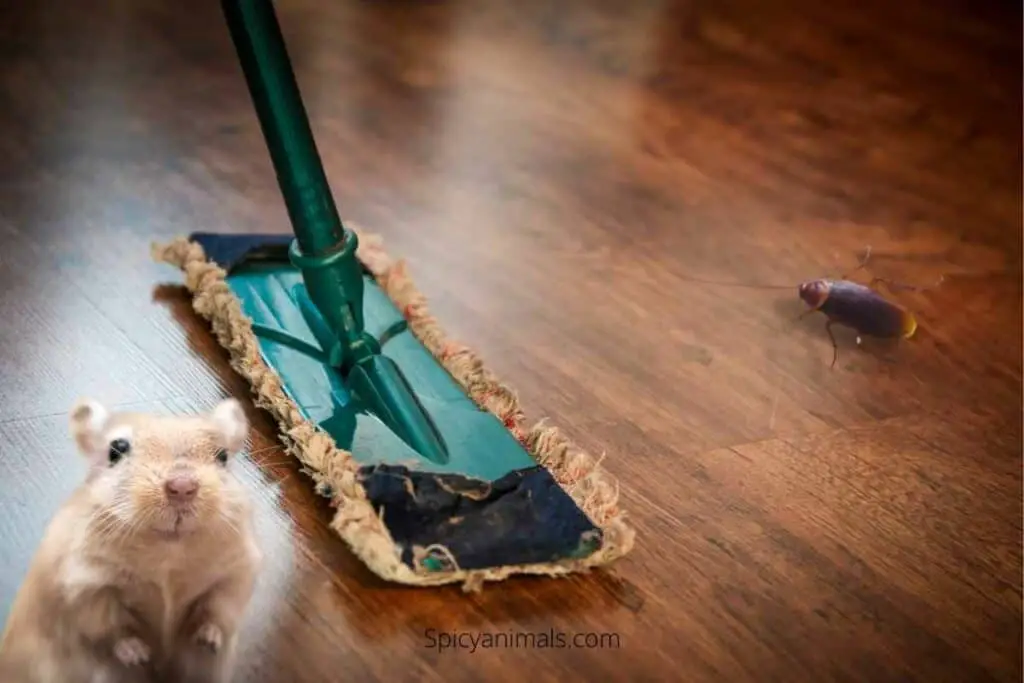Bonding with your gerbil is important for several reasons. Firstly, it helps to build a strong and trusting relationship between you and your pet. By spending quality time together, you can establish a bond based on mutual understanding and companionship. Secondly, bonding with your gerbil can help to reduce any fear or anxiety they may have, making them feel more secure and comfortable in their environment. This can lead to a happier and healthier gerbil overall. Lastly, bonding with your gerbil allows you to better understand their unique personality and behavior, enabling you to provide the best care possible. So, take the time to bond with your gerbil and enjoy the rewarding experience of a strong and loving relationship.
Table of Contents
Benefits of a strong bond with your gerbil
Building a strong bond with your gerbil can have numerous benefits for both you and your furry friend. Firstly, a strong bond can enhance the overall well-being and happiness of your gerbil. When your gerbil feels comfortable and secure in your presence, it will be more likely to exhibit positive behaviors and have a better quality of life. Additionally, bonding with your gerbil can also lead to a deeper understanding of its needs and preferences, allowing you to provide better care and meet its specific requirements. Moreover, a strong bond with your gerbil can provide you with a sense of companionship and fulfillment. Interacting with your gerbil on a regular basis can be a source of joy and relaxation, helping to reduce stress and improve your overall mental well-being. Overall, investing time and effort into building a strong bond with your gerbil is a rewarding experience that can bring you closer and create a happier and healthier environment for both of you.
Common challenges in bonding with gerbils
Bonding with gerbils can be a rewarding experience, but it is not without its challenges. One common challenge in bonding with gerbils is their natural skittishness and wariness of humans. Gerbils are prey animals by nature, so it takes time and patience to earn their trust. Another challenge is their small size, which can make handling them a bit tricky. It is important to handle gerbils gently and with care to avoid causing them any stress or injury. Additionally, gerbils are social animals and may become stressed or anxious if they are kept alone. It is recommended to have at least two gerbils together to provide companionship and reduce their stress levels. Overall, bonding with gerbils requires understanding their unique nature and providing a safe and comfortable environment for them to thrive.

Creating a Safe Environment for Bonding with Your Gerbil
Choosing the right cage
Choosing the right cage for your gerbil is crucial for their well-being and happiness. When selecting a cage, it’s important to consider the size, material, and design. Gerbils are active animals and require plenty of space to move around and exercise. A spacious cage with multiple levels and platforms will provide them with opportunities for climbing and exploring. Additionally, opt for a cage made of sturdy and non-toxic materials to ensure the safety of your gerbil. It’s also essential to choose a cage with a secure lid or door to prevent any escapes. By providing a suitable and comfortable cage for your gerbil, you are creating a conducive environment for bonding and building a strong relationship with your furry friend.
Providing proper bedding and nesting materials
When it comes to providing proper bedding and nesting materials for your gerbil, there are a few key things to keep in mind. First, it’s important to choose bedding that is safe and comfortable for your furry friend. Avoid using materials that are dusty or have strong odors, as these can irritate your gerbil’s sensitive respiratory system. Opt for bedding made from natural materials, such as paper or aspen shavings, that are absorbent and easy to clean. Additionally, providing nesting materials, such as shredded paper or tissue, will allow your gerbil to create a cozy and secure space to rest and sleep. Remember to regularly check and replace the bedding and nesting materials to ensure your gerbil’s comfort and hygiene.
Ensuring a quiet and stress-free space
Creating a quiet and stress-free space is crucial for bonding with your gerbil. Gerbils are sensitive animals and can easily become stressed in noisy and chaotic environments. To ensure a calm atmosphere, it is important to find a quiet area in your home where you can interact with your gerbil without distractions. This could be a spare room, a corner of your living room, or even a designated gerbil play area. Make sure to minimize any loud noises or sudden movements that could startle your gerbil. By providing a quiet and stress-free space, you are creating the perfect environment for bonding and building trust with your gerbil.
Building Trust
Approaching your gerbil with patience
Approaching your gerbil with patience is crucial for building a strong bond with your furry friend. Gerbils are naturally skittish creatures, so it’s important to give them time to feel comfortable in your presence. Start by sitting near their cage and speaking softly to them, allowing them to become familiar with your voice. Avoid making sudden movements or loud noises that could startle them. Once they seem more at ease, you can slowly introduce your hand into their cage, allowing them to sniff and explore it at their own pace. Remember to be gentle and avoid grabbing or squeezing them. Building trust takes time, so be patient and consistent in your approach. With time and patience, your gerbil will come to see you as a trusted companion and enjoy spending time with you.
Offering treats as positive reinforcement
When it comes to bonding with your gerbil, offering treats as positive reinforcement can be a great strategy. Gerbils are naturally curious and food-motivated creatures, so using treats as a reward can help build trust and strengthen the bond between you and your furry friend. When offering treats, make sure to choose healthy options that are safe for gerbils, such as small pieces of fruit or vegetables. It’s important to remember that treats should only be given in moderation to maintain a balanced diet for your gerbil. By offering treats as positive reinforcement, you can create a positive association with you and establish a deeper connection with your gerbil.
Handling your gerbil gently and regularly
When it comes to handling your gerbil, it is crucial to do so gently and regularly. Gerbils are delicate creatures, and rough handling can cause them stress and discomfort. To bond with your gerbil, make sure to approach them calmly and with a gentle touch. Start by offering them treats or toys to create a positive association. Gradually, you can begin to hold your gerbil in your hands, supporting their body properly and avoiding any sudden movements. Regular handling will help your gerbil become more comfortable with you and develop trust, leading to a stronger bond between you and your furry friend.
Socializing with Your Gerbil
Playing interactive games
Playing interactive games is a great way to bond with your gerbil. These games not only provide mental stimulation for your pet but also allow you to spend quality time together. One fun game you can play is hide and seek. Hide small treats or toys around your gerbil’s enclosure and watch as they search and discover them. Another game is the obstacle course, where you can create a mini agility course using household items for your gerbil to navigate through. Remember to always supervise your gerbil during playtime and ensure their safety at all times.
Providing opportunities for exercise
Providing opportunities for exercise is essential for bonding with your gerbil. Gerbils are active creatures that need regular physical activity to stay healthy and happy. You can create a gerbil playground by adding tunnels, wheels, and climbing structures to their habitat. This will not only provide them with exercise but also stimulate their natural instincts. Additionally, you can let your gerbil explore a safe, enclosed space outside of their cage under supervision. This will allow them to stretch their legs and experience new sights and smells. Remember to always provide fresh water and a balanced diet to support their energy levels during exercise. By providing opportunities for exercise, you are not only promoting their physical well-being but also strengthening the bond between you and your gerbil.
Allowing supervised exploration outside the cage
Allowing supervised exploration outside the cage is an important aspect of bonding with your gerbil. By providing a safe and controlled environment for your gerbil to explore, you are allowing them to satisfy their natural curiosity and need for mental stimulation. It also provides an opportunity for you to interact with your gerbil in a different setting, building trust and strengthening your bond. During supervised exploration, make sure to closely monitor your gerbil to ensure their safety and prevent any potential accidents. Offer treats and positive reinforcement to encourage your gerbil to explore and interact with you. This time outside the cage can be a fun and enriching experience for both you and your gerbil, deepening your connection and creating lasting memories.
Understanding Gerbil Behavior
Recognizing signs of fear or stress
Recognizing signs of fear or stress in your gerbil is crucial for creating a strong bond with your pet. Gerbils are naturally curious and social animals, but they can also experience fear and stress in certain situations. Some common signs of fear or stress in gerbils include hiding, excessive grooming, teeth chattering, and aggressive behavior. It is important to pay attention to these signs and provide a calm and safe environment for your gerbil to help alleviate their fears and reduce stress. Spending quality time with your gerbil and offering them treats and toys can also help build trust and strengthen your bond. By recognizing and addressing signs of fear or stress, you can create a positive and nurturing environment for your gerbil, allowing your bond to flourish.
Interpreting body language
Interpreting body language is crucial for understanding your gerbil’s emotions and intentions. Gerbils communicate through various body movements and postures, which can provide valuable insights into their well-being. For example, a gerbil that stands upright with its tail raised high may be feeling threatened or aggressive, while a gerbil that rolls onto its back and exposes its belly is displaying a sign of submission. By paying close attention to your gerbil’s body language, you can develop a deeper bond with your pet and respond to their needs more effectively.
Addressing aggressive behavior
Addressing aggressive behavior in gerbils is an important aspect of building a strong bond with your pet. Gerbils, like any other animal, may exhibit aggression for various reasons, such as fear, territoriality, or discomfort. It is crucial to understand the underlying cause of the aggression and take appropriate steps to address it. One effective way to address aggressive behavior is by providing a safe and stimulating environment for your gerbil. This includes ensuring they have enough space, toys, and hiding spots. Additionally, regular handling and socialization can help your gerbil feel more comfortable and less aggressive. If the aggression persists or becomes unmanageable, it is advisable to seek guidance from a veterinarian or an animal behaviorist who can provide expert advice and support. By addressing aggressive behavior in a timely and compassionate manner, you can create a harmonious and loving bond with your gerbil.
Maintaining a Strong Bond
Spending quality time with your gerbil
Spending quality time with your gerbil is essential for building a strong bond and fostering a healthy relationship. One of the best ways to do this is by engaging in interactive play sessions. Set aside dedicated time each day to engage your gerbil in activities such as running through tunnels, playing with toys, or even teaching them simple tricks. This not only provides mental stimulation for your gerbil but also allows you to build trust and create a positive association with spending time together. Additionally, consider letting your gerbil explore outside of their cage in a safe and supervised environment. This will give them the opportunity to exercise and explore their surroundings, further strengthening the bond between you and your furry friend. Remember, the key to bonding with your gerbil is consistency, patience, and lots of love and attention.
Engaging in regular grooming
Engaging in regular grooming is an essential aspect of bonding with your gerbil. Not only does it help maintain their overall health and hygiene, but it also provides an opportunity for you to establish trust and build a strong connection with your furry friend. Grooming sessions allow you to physically interact with your gerbil, which can help them become more comfortable with your touch and presence. Additionally, grooming provides a chance for you to closely examine your gerbil’s fur, skin, and nails, allowing you to detect any potential health issues early on. By regularly engaging in grooming activities, you not only ensure the well-being of your gerbil but also strengthen the bond between you two.
Offering a variety of toys and enrichment activities
Offering a variety of toys and enrichment activities is essential for bonding with your gerbil. Gerbils are curious creatures and providing them with different toys and activities not only keeps them entertained but also helps to build a strong bond between you and your pet. You can offer a range of toys such as tunnels, chew toys, and exercise wheels to keep your gerbil physically active and mentally stimulated. Additionally, you can introduce enrichment activities like hiding treats or creating an obstacle course to challenge your gerbil’s problem-solving skills. By offering a variety of toys and enrichment activities, you are creating a stimulating and engaging environment for your gerbil, which will ultimately enhance your bond and create a happy and healthy relationship.
Next Steps: Now that you have learned some valuable tips for bonding with your gerbil, it’s time to put them into action and strengthen your relationship with your furry friend. Remember to be patient and consistent in your efforts. Spend quality time with your gerbil every day, offering treats, gentle handling, and engaging in interactive play. Gradually increase the duration of your interactions, allowing your gerbil to become more comfortable and trusting.



